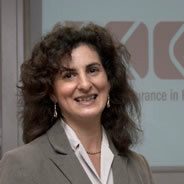The Kingston City Group (KCG) Consortium became a Cost Sharing Group (CSG) on 1 August 2013 under the UK Finance Act 2012 and is the first fully operational CSG in this sector. KCG provides services to the member institutions fully exempt of VAT, thus providing real cost savings. Maria Vetrone is the Managing Director of KCG and she shares some of the lessons being learned along the way.
What’s the background to the Kingston City Group?
The KSG consortium was formed as an unincorporated association in August 2005 by the four founding member institutions to serve the internal audit and management assurance needs of HEIs in London and the South East on a shared services and shared cost basis. We operate only within the HE sector and we are owned by the current 12 member institutions. The consortium is governed by the KCG Board on which each member institution is represented at senior levels.
Why did you want to form a cost sharing group?
From August 2013, KCG has included within its operations a cost sharing group (CSG) arrangement under the UK Finance Act 2012. This arrangement allows us to make wholly VAT exempt supplies on the total costs of the services provided to our member institutions that meet the eligibility criteria for admission to a CSG.
What conditions were you required to meet?
Setting up the CSG was, in some aspects, perhaps made a little easier for KCG as we were operating as a consortium and this already addressed some of the conditions attached to the VAT exemption requirements. For example:
- The ‘independent group of persons’ (a CSG) supplying services to persons who are its members – the KCG consortium is owned by the 12 member institutions and all KCG staff are jointly employed by them.
- The CSG must be a separate taxable person from its members in order to be able to make exempt supplies for VAT purposes to its members – KCG as an unincorporated association was already registered for VAT.
- The CSG only recovers the members’ individual share of the expenses incurred by the CSG in making the exempt supplies to its members – KCG already operated on a non-profit making basis, the member institutions share all costs in proportion to the services received. In addition funds, whether generated from services to members or fees charged at commercial rates to non-members, continue to remain in the ownership of our member institutions and are to be applied as directed by the KCG Board. The creation of funds, the levels of annual funding and the draw down from funds require the approval of the KCG Board.
- The application of the exemption to the supplies made by the CSG to its members is not likely to cause a distortion of competition – our constitution does not provide for KCG to enter in to formal tendering arrangements but to make an alternate proposal where invited to do so.
Have you had any support?
Yes, Hefce has proved to be a valuable resource in aiding us in setting up the CSG, with representation on our CSG working group. The working group was set up to review the current workings of KCG and how best to progress to a CSG. Hefce’s work to raise awareness and promote good practice through their high level guide ‘Guidance on the Cost Sharing Group Exemption’ has been very informative.
We are planning to continue working on the further development and on the future corporate structure of the CSG. We have applied for the funding that Hefce has made available for developing and disseminating good practice in shared services with the particular aim of supporting the development of CSGs.
What do you need to do now?
We’ve set up a framework to ensure that a number of conditions set by HMRC continue to be met. We must demonstrate that the services supplied are ‘directly necessary’ (the 85% test) for a CSG member’s VAT exempt and/or non-business activity. The member institutions are required to make an annual declaration, providing us with details of the partial exemption recovery rates for the year then ended and an estimate for the coming year. The framework also includes a process for the admission of new members and exit of members that fail to meet the criteria.
The further development of the CSG includes addressing some issues which will require some discussion and agreement to be reached with HMRC:
- CSGs receiving grants may inadvertently realise a profit, which is not allowed under HMRC rules;
- how to increase the awareness of CSGs with in this sector under the limitation of the HMRC condition relating to market distortion; and
- to fully manage the position where a service is supplied to non-CSG member institutions which may wish to join the CSG, but this may be contrary to HMRC rules.
How will your corporate structure evolve?
The future development of our corporate structure will raise issues, and incur significant costs for professional and specialist advice, that will require careful consideration. For example, a change in structure to a company limited by guarantee will give rise to the following:
- a pension fund deficit may be realised;
- there would have to be extensive consultation with our staff, as we would all be transferred under TUPE Regulations;
- terms and conditions of employment would have to be drawn up for the new company;
- our staff would be jointly employed, rather than the current situation of joint and several employment, by our Member institutions;
- our Consortium Agreement would require extensive revision.
Maria Vetrone is the Managing Director of the Kingston City Group
(Revised 3 March 2014)








